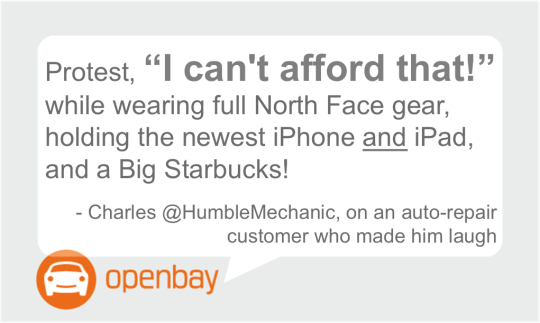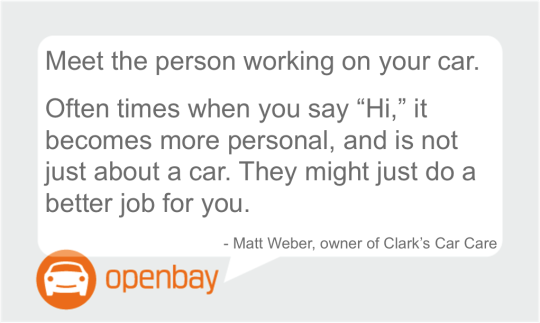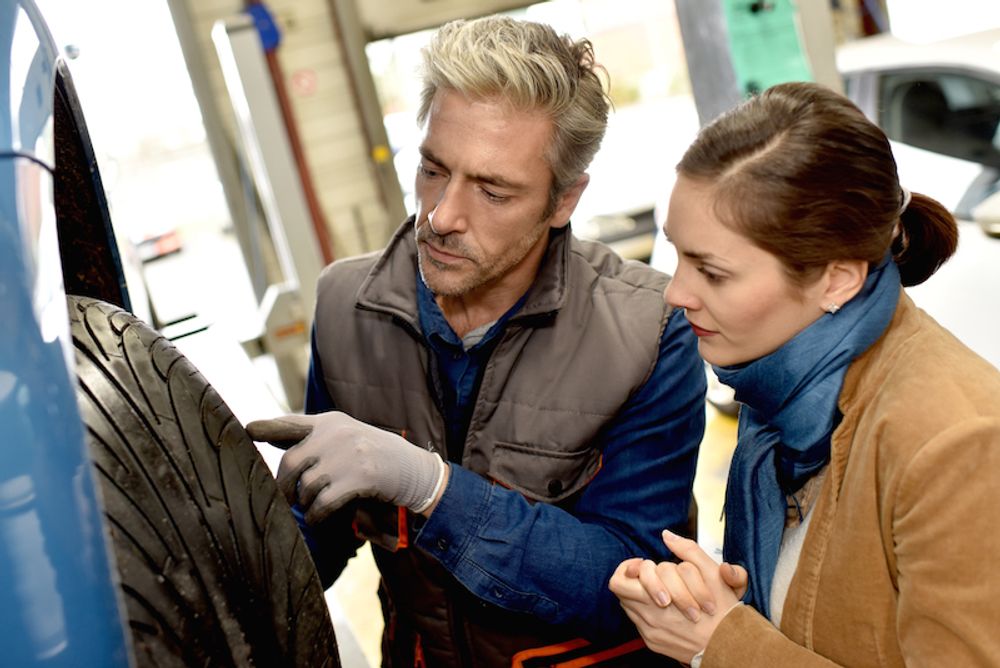Before you head off to your automotive technician, make sure you don’t run afoul of some basic ‘service lane etiquette.’ We spoke with some technicians (or mechanics), shop owners and managers to get their take on how to talk to a mechanic. You may be surprised by the things you should stop asking, as well as what you should ask.
Directly From The Source:
Here’s what makes these mechanics laugh, what annoys them, and some notes about how best to approach your vehicle service or repair.
The following statements are from professionals in the auto industry, in their own words.
Charles, HumbleMechanic:
I recommend vehicle owners shouldn’t say to their mechanics:
-
‘Just do what it needs.’ – This can leave a vehicle owner open for a very expensive repair. Saying this to the wrong mechanic or service advisor may cost you more in the end. You may get sold something that you did not need to have performed.
-
‘I don’t know anything about cars.’ – While many people may feel this way, I never believe it. Plus in today’s world there is no reason to not educate oneself on any topic. Sure – you may not know the inner workings of a direct-injection engine, but I would guess that most folks know what an air filter is. It tells you what it does right in the name.

Some funny things customers say:
-
‘I can’t afford that.’ – … While wearing full North Face gear, has the newest iPhone AND iPad, and while holding a Big Starbucks!
-
‘But it’s a brand new car.’ – Just because you are still paying it off doesn’t make your five-year old, 60,000-mile car new!
-
‘You just plug it in to the computer.’ – That only gives techs information to start with. Rarely does diagnostic equipment have a “Hey replace this part” screen.
Bob Chandler, service manager, Bonded Transmissions, Framingham, MA:
Here’s one that made me laugh: a guy submitted a request through Openbay, and messaged me, ‘How much to fix the dent?’ But he hadn’t even sent us a picture.
Also, I tell people that we are a for-profit business, and that we’re a .com, not a .org. There are many other expenses we have to incur in order to keep the business going. People will complain, ‘I know I can buy that part in a store for X, so why are you charging me this?’ and I respond, ‘Would you bring your steak to the restaurant and ask them to cook it?’
Audra Fordin, owner, Great Bear Auto Repair in Flushing, NY & founder of Women Auto Know:
-
‘Can’t you do it for a better price? Jiffy Lube says they’ll do the job for a lot less.’
First:
It’s impossible to judge the cost of a repair based on labor rate alone. One mechanic charges $100/hour and another charges $50/hour. Which one is the better deal? It looks obvious, but really isn’t. The first mechanic might have 2-10 times as much experience as the second. If the first mechanic can finish the job within an hour, but the second one requires three hours… now which one is the better deal?
Second:
You get what you pay for. When it comes to service professionals, you’re not paying for one job in isolation. You are paying for the years of training, development, and experience they have acquired. Would you hire the cheapest doctor in town? I hope not. Mechanics are like doctors for cars, so perceive them in a similar way. Automobiles are the second largest investment most people make in their lifetimes. Take good care of them.’
-
‘I don’t need to fix that. I only drive the car to the supermarket and back. It’s just short trips.’
Even if you’re not logging a lot of miles, most drivers will eventually sell or trade their vehicles. The buyer can find out everything about that vehicle’s history. When they discover it’s in poor condition due to a lack of maintenance, how do you think they will feel? Not confident. At best, the re-sell value will go downhill. At worst, they will lose all interest. Also, reality check: 77% of traffic accidents occur within 15 miles of home. Don’t assume you’ll be able to escape consequences of ignoring a fix forever.
Frank Leutz, owner of Desert Car Care in Chandler, AZ, & board member of the Automotive Service Association (ASA):
-
Never dictate what you think is wrong
… by saying something like ‘My alternator needs to be replaced.’ That could get you into trouble if they replace the part, only to find your problem isn’t solved.
-
Treat your visit with a mechanic like you would a visit to the doctor.
It’s all about the symptoms: ‘My battery needs to be jumpstarted in the morning, or it’s making this sound.’ For a nice, wholesome A-Z experience, you want to give the complaint, then let the mechanic confirm the cause and correction.
Matt Weber, owner of Clark’s Car Care, Naperville, IL
-
‘How come I cannot bring in my own parts?’
Bottom line: it’s a huge liability/profitability issue. If customer-sourced part is wrong, who pays for the down time on the lift? If a lawsuit were to happen, based on that service, the shop would lose instantly. I have seen it happen, and had to serve as a professional witness in court. The judge rules that the shop should have known better, and that it would be held liable if that part failed.
-
Don’t assume they check everything when the car is brought in to the shop.
No one has that kind off time to look at everything, so be as specific as possible if you have particular concerns about your vehicle
-
‘I Googled my problems and the internet said this,’ or ‘My uncle said this was the problem.’
Customers should ALWAYS test drive with someone at the repair facility to show the problem, such as which light is on, or to point out any noises. Most of the errors and poor communication starts at the front desk.

It’s a good idea to meet the actual person who is working on your car; that person is responsible for your safety, and for where you money is going. Customers rarely get to actually meet their mechanics, maybe because they don’t always have the best people skills. But often times when you say “Hi,” and meet the person, it becomes more personal, and is not just about a car. They might just do a better job for you too.
John Gardner, ASE-certified master mechanic, host of Velocity TV’s TechGarage & award-winning instructor at Chipola College in Marianna, FL

-
Don’t be afraid to ask anything.
If the tech is making fun of you because you asked something, they should explain it. Things are becoming more complex – we’re putting nitrogen in the tires now, not air. There’s no silly question you can ask, you just may want to avoid some of the above when thinking about what you shouldn’t say to your mechanic.
Everyone is Different
The above advice is all directly from the mouths of professionals in the automotive industry. But, keep in mind, they may not speak for your own local mechanic. Nonetheless, their words should provide you with a helpful guideline as to what to avoid at your next visit to the repair shop.
Now that you know how to best approach your mechanic, are you ready to bring your car in for a repair?

